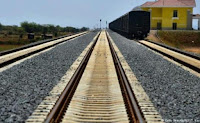The cause of Tanzania's "resource Nationalism"
 |
| Tanzania's SGR: under Construction |
Eureka! East African watchers say. “This explains the sudden
surge in resource nationalism in Tanzania,” said a Nairobi based economist. The
line attracted no takers after the
The project was too pricey for the Tanzania budget which was
US$15 billion in the 2018/2019 financial year, data crunchers say. Of this,
$5.8 billion was set aside to finance development projects,-roads, airports,
schools, hospitals, and the Railways line. At $1.9 billion, the line gobbled up
$664 million a year since 2016/2017 financial year. That is whopping 11 to 14
percent of the development budget!
Is it a coincidence then that resource nationalism surged at
about the same time? Wondered a trade expert based in Kampala, Uganda. Resource
nationalism involves, but is not limited to, what economists call “Obsolescing
Bargain.” This is a situation where the
investor loses the bargaining power to the host government once the investment
is in place and cannot be transferred elsewhere. It is, put simply, the ability
to blackmail and extort.
Tanzania has
exploited this power ruthlessly. President Magufuli came into office promising
to be the new broom that will sweep the country of corruption. And fighting
corruption has become the mantra exploited to extort and blackmail investors to
submission.
 |
| The Bulldozer: Tanzania's President Magufuli |
This demand jolted investors in Tanzania some of whom held
back their investment plans while foreigners seeking to invest in the country
returned their proposals to the shelves. US$ 190 billion is 3.8 times larger
than Tanzania’s current GDP, estimated at US$50 billion. Spread over 17 years,
this demand comes to an average tax bill of $11.2 billion a year. Given that the government budget has just
crossed the US$14 billion mark, then Acacia Mining Plc taxes could fund the
government’s budget for whole years since 2000! That, observers say, is
fantastic.
The most recent case is the extortion to Bharti Airtel, the
Indian mobile telephone company. The firm had to cede 9 percent stake to the
government-owned TTCL, cancel a US$407 million the government owes Airtel Tanzania, the local outfit; Pay US$2 million in penalties and good will, pay$4.4 million in
unearned dividends over the past ten years, and a total of U$26 million broken
into 60 tranches of US$434,000 of unknown budgetary vote, the local press
reported. All to resolve a dispute over the ownership of the company which the
Tanzania government claims it was cheated out of during the transfer of the company from Celtel to Airtel.
PresidentMagufuli bluntly told the press that he would have
de-registered the company had it sought international dispute resolution. This,
East Africa watchers say, is a pointer to what foreign investors are going
through in Tanzania whenever a dispute arises. The government holds a gun over
their heads during the negotiations!
Apparently, the government has found a way of raising some
of the funds it needs to support its development programs through
extortion.
And to cover its back, in July 2017, Tanzania enacted three
laws asserting “permanent sovereignty” over its natural resources including oil
and gas while drastically amending the country’s mining code. Together with new
regulations, the laws allow the government to renegotiate an investor-state contract
terms that parliament deems “unconscionable”, and impose quotas for the
procurement of local goods and services, and employment of local personnel. The
government is also entitled to a free equity interest of between 16 percent
and 50 percent in mining groups, which are prohibited from suing the
state in
courts outside Tanzania.
The economic damage caused by Tanzania’s policy shift is
glaring. According to IMF, the country’s GDP growth rate has faltered,
declining to an estimated 4 percent over the next four years, from 7.2 percent in 2015. The country has slipped
from the second fastest growing economy in
East Africa to the fourth.
Despite vehement denial by the government, the evidence is
visible. The budget this year grew by 1.5 percent to $14.4 billion down from
$14.5 billion last year. In terms of Tanzania shillings, the budget expanded by
only Tsh 500 billion over the last Financial year.



Comments
Post a Comment